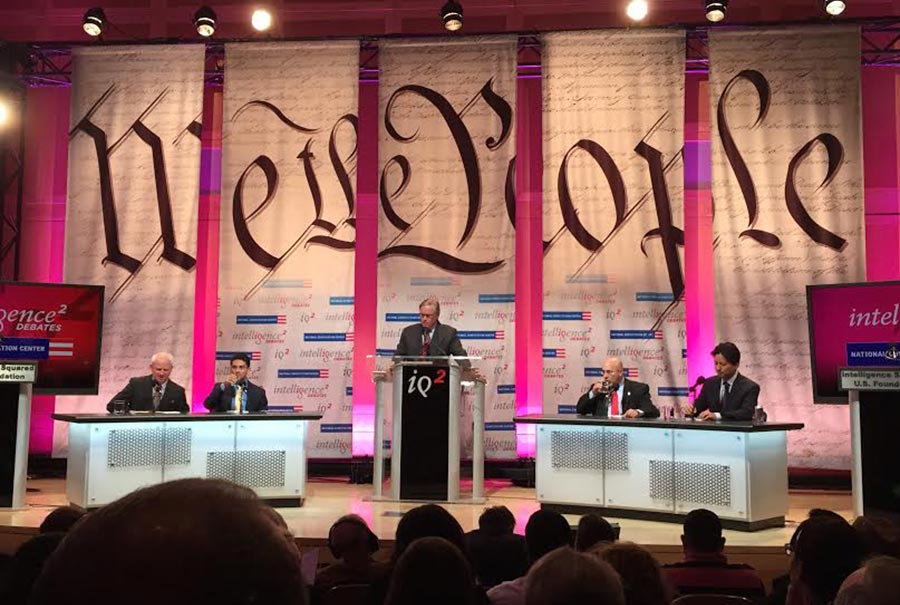Marriage equality won big in Philadelphia this week at the National Constitution Center.
Broadcast by National Public Radio, the NCC on Tuesday played host to an Intelligence Squared U.S. debate that questioned whether the Equal Protection Clause of the U.S. Constitution requires states to license same-sex marriage — just weeks before the Supreme Court is set to answer that very question.
Debate panelists included National Organization for Marriage chairman John Eastman and co-author of “What is Marriage?” Sherif Girgis, who argued against marriage equality, while Freedom to Marry founder and president Evan Wolfson and author of “Speak Now: Marriage Equality on Trial” Kenji Yoshino argued in favor.
The pro-marriage-equality side ultimately won the debate: In a poll before the event, 53 percent agreed with the marriage-equality backers, 34 percent were undecided and 13 percent were against but, by the end, 83 percent supported the arguments of the pro-marriage-equality side, 3 percent were undecided and 14 percent sided with opponents.
Moderated by ABC News correspondent John Donvan, the debate started with opening statements from both sides.
Girgis argued that concluding states have the right to deny marriage licenses to same-sex couples is not motivated by animus.
“The Constitution does not tell you which of those views to adopt,” he said. “Is marriage about deep romantic love and stability or do we have a different vision — a more traditional and conjugal view, in which a man and a woman are coming together oriented to family life?”
Eastman continued, arguing that applying the Equal Protection Clause to this issue would change a longtime societal institution and would be invoked for a dramatically different purpose than it ever was before.
Wolfson instead argued that the Constitution should be interpreted in a modern context — noting the growing public opinion in favor of same-sex marriage, and pointing to the 65 courts that have ruled in favor of marriage equality.
“Shift in public opinion tells us something — it tells us about the growing understanding as to how and why the Constitution does apply to gay people’s lives and dreams,” he said. “In the past two years, both state and federal courts, Republican and Democratic appointees, have ruled in favor of the freedom to marry. These rulings show that gay people share the same mix of reasons for wanting and needing the right to marry as heterosexual people do.”
Yoshino challenged Girgis’ view of family life, stating the argument that heterosexual couples raise children better had no basis.
“The argument is that we are doing a worse job at raising [children] than heterosexual couples,” Yoshino said. “Every major professional organization that touches the interest of children — all of these organizations have said that gay parents are doing just as well as straight parents in raising their children. The kids are all right.”
Yoshino continued that LGBT individuals are not asking for a new right in the fight for marriage equality, but rather they are a new group asking for access to an existing right.
Eastman said that, if the purpose of marriage is to foster the love and commitment of the relationship, then it would be a violation of the Equal Protection Clause to deny marriage to same-sex couple; however, he aruged, marriage has a different purpose, centered on “this unique biological complementarity that brings men and women together for the purpose of producing children that are the result of that union.”
Wolfson disputed the notion that procreation is at the root of the institution.
“People marry for many reasons and we do not have the government dictating to you why you married the person you love and what your marriage needs to be about,” he told Eastman. “For many people, marriage is about raising children — whether they are gay or not gay — and for many people it is not about raising kids at all.”
In his closing statement, Eastman argued that, ultimately, the decision on marriage equality should be left to the public.
“In 2012, the European Convention of Human Rights said that their constitution does not require members of state governments to grant same-sex couples the access to marriage, and yet, just last week, Ireland voters chose to do that,” he said. “What we’re asking for here is the same thing. The question ought to be up to the voters.”
In his final remarks, Yoshima emphasized how equal protection under the law allowed him to create a life for his family that many other LGBT people are deprived of.
“At the time when I came out, I was extremely fortunate that sodomy laws were gone and that I would no longer be deemed a criminal for engaging in sexual conduct with someone of the same sex. By the time I met the man who I made a lifelong commitment to, it was possible to marry him in the state of Connecticut. And by the time we decided we wanted children, surrogacy laws and adoption laws made it possible for us to welcome first a daughter and then a son into the world,” he said. “Whenever I hear my opposition make arguments about how this is just the selfish desires of adults or that we are radically changing the definition of marriage, I always think back to my husband and to my children. We can stop living under the equal-protection law and finally, as lesbian and gay couples, live up to it.”
SCOTUS is expected to deliver its ruling by the end of the month in Obergefell vs. Hodges, the case that could give all same-sex couples across the nation the freedom to marry.

